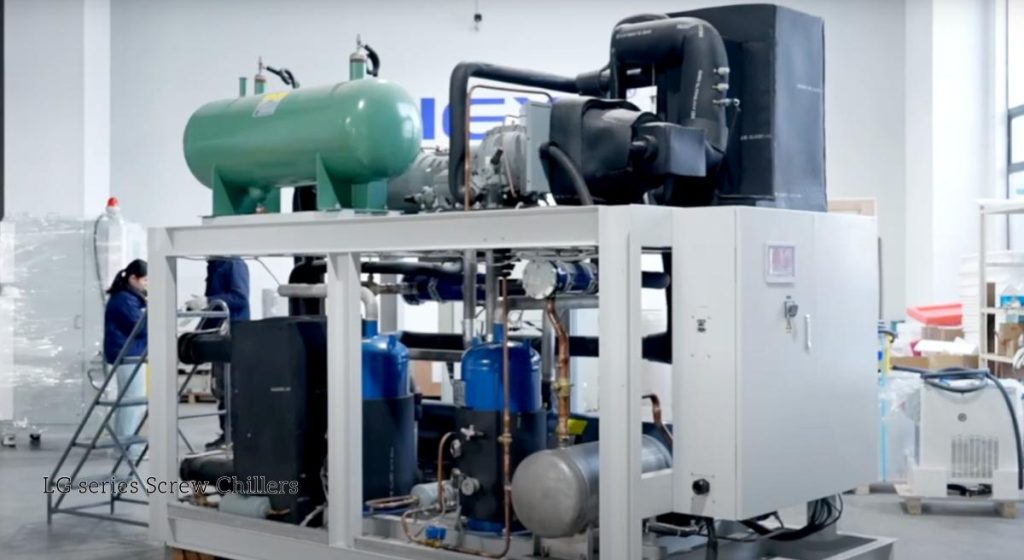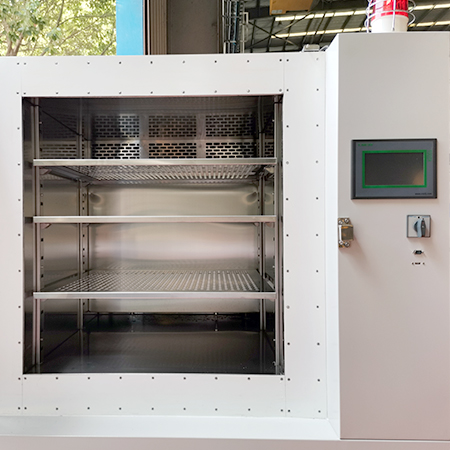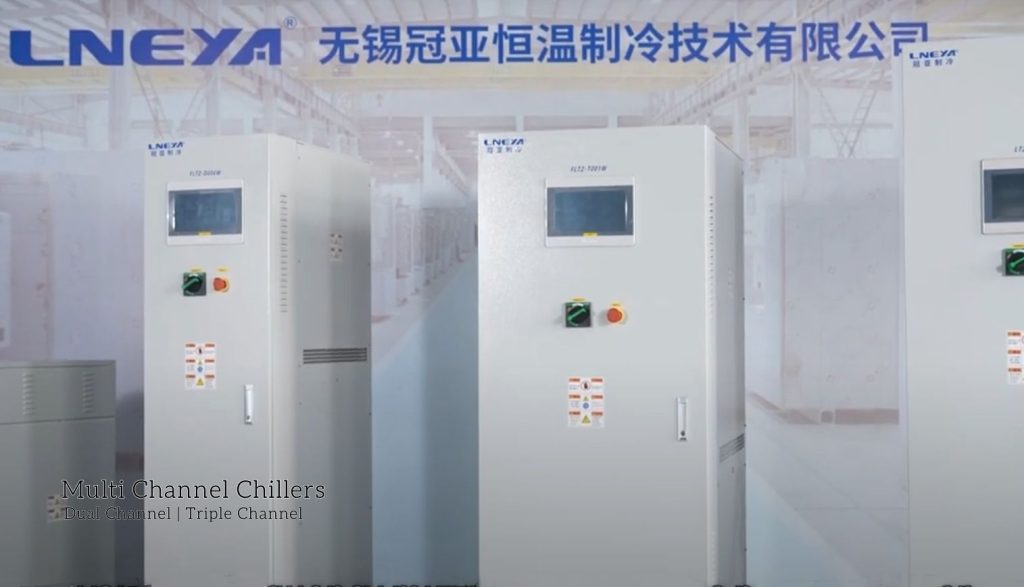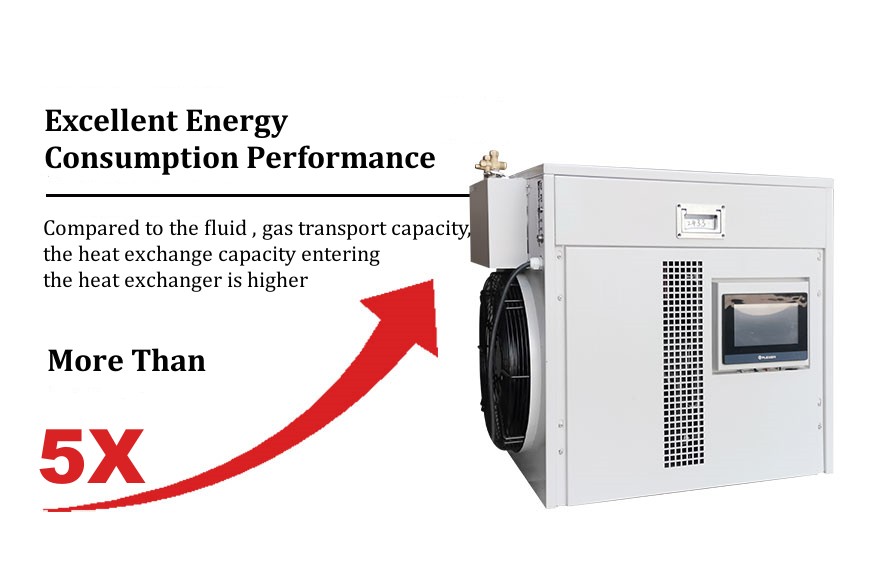API Reactor Cooling — Chiller Solutions and Temperature Control Strategies

- How to Upgrade an Old Chiller to Improve Efficiency
- Chiller Tanks Comparison Expansion Tank vs Buffer Tank
- Expansion Tanks in Semiconductor Chillers
- How Explosion-Proof Chillers Work Principles and Design
- Agosto 2025
- Luglio 2025
- Giugno 2025
- Maggio 2025
- Marzo 2025
- Febbraio 2025
- Gennaio 2025
- Dicembre 2024
- Novembre 2024
- Ottobre 2024
- Settembre 2024
- Agosto 2024
- Luglio 2024
- Giugno 2024
- Maggio 2024
- Aprile 2024
- Marzo 2024
- Febbraio 2024
- Settembre 2023
- Luglio 2023
- Giugno 2023
- Maggio 2023
- Gennaio 2023
refrigeratore raffreddato ad aria refrigeratore refrigeratori Congelatore a freddo refrigeratore di raffreddamento circolatore di raffreddamento e riscaldamento sistema di raffreddamento e riscaldamento cooling water chiller Double-Layer Glass Reactor sistema di controllo dinamico della temperatura Controllo della temperatura del liquido fluorurato congelatore refrigeratore a gas circolatore di riscaldamento industrial chiller industrial cooling industrial freezer frigorifero industriale jacket reactor refrigeratore a liquido refrigeratore a bassa temperatura news pharmaceutical chiller process chiller reactor chiller reactor cooling reactor cooling heating riscaldamento del reattore raffreddamento reactor system circolatore refrigerato refrigeration chiller refrigeratore a vite refrigeratore per semiconduttori refrigeratore di prova per semiconduttori sundi tcu controllo della temperatura camera di prova termostato refrigeratore a bassissima temperatura refrigeratore di prova per veicoli refrigeratore d'acqua refrigeratore raffreddato ad acqua wtd
An Active Pharmaceutical Ingredient (API) is the biologically active component in a drug responsible for its intended therapeutic effects. For example, the API in ibuprofen tablets is ibuprofen. Most APIs are complex organic compounds, and their production involves a variety of chemical reactions, including condensation, oxidation, reduction, and cyclization.
These reactions release significant amounts of heat. Insufficient cooling can degrade the API and pose significant process safety risks. Therefore, refrigeratori industriali or sistemi di controllo dinamico della temperatura are essential equipment for pharmaceutical reactors.
Challenges of Pharmaceutical Reactor Temperature Control
Highly Exothermic Reactions
Many chemical reactions in API manufacturing rapidly release significant amounts of heat once initiated. Failure to dissipate this heat in a timely manner can lead to thermal runaway. You might think that thermal runaway simply halts the reaction and compromises product quality. In reality, some reactions at high temperatures can produce CO2 or hazardous gases, which can increase pressure in a sealed reactor and create a significant risk of explosion and leakage.
Multi-Stage Temperature Control
The complete API synthesis process typically involves multiple stages, including reaction initiation, main reaction, intermediate transformation, and controlled crystallization, each with different temperature requirements. At the start of the reaction, the reaction rate must be controlled by temperature control.
During the main reaction phase, the reactants should be slowly heated within the reactor. During the intermediate conversion phase, the temperature should be lowered to a range suitable for the intermediate conversion.
During the crystallization phase, the reaction solution should be cooled to a low temperature and maintained at a constant temperature to ensure uniform crystallization of the product. A chiller with only simple cooling and heating functions cannot meet complex temperature control requirements.
Contamination
Because APIs are intended for human use, they require extremely high cleanliness levels. Any impurities can compromise the purity, safety, and efficacy of the drug. Although the reactor cooling system does not directly contact the API, if an open-loop cooling system is used, or if the system employs non-pharmaceutical-grade coolant and has potential leak points, contamination risks increase.
Pharmaceutical Reactor Temperature Control Solutions
Precise Temperature Control
Industrial chillers use multiple Pt100 sensors for sampling at the coolant inlet and outlet, as well as within the reactor. This high sampling frequency and low error allow for real-time monitoring of temperature fluctuations within the reactor.
Furthermore, the control system utilizes a PID algorithm to automatically adjust cooling and heating power based on changes in heat load, preventing temperature overshoot or undershoot. The system supports multiple levels of temperature precision, which can be tailored to specific process requirements.
Multi-step Temperature Profile
The temperature profile control function allows you to pre-program the reaction process in stages, including parameters such as target temperature, ramp rates, and hold time. Once programmed, the chiller automatically executes the program, switching between cooling and heating. Furthermore, temperature curves can be saved and reused, helping to improve reaction consistency.

Closed-Loop System
While any small leak in an open cooling system could indirectly enter the reactor, a closed-loop chiller prevents contact between the coolant and the reactants at the source. The coolant in a closed-loop system has no direct contact with air, preventing coolant oxidation, moisture absorption, or evaporation, even under elevated temperatures. This prevents impurities such as air, dust, and microorganisms from entering the circulation system, ensuring compliance with cleanroom standards.
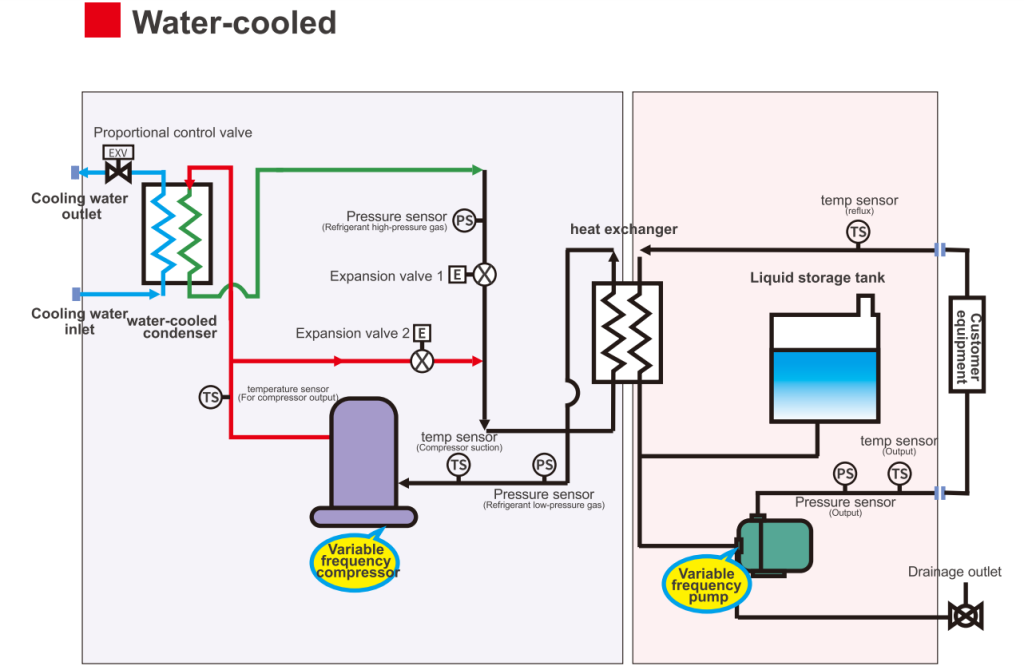
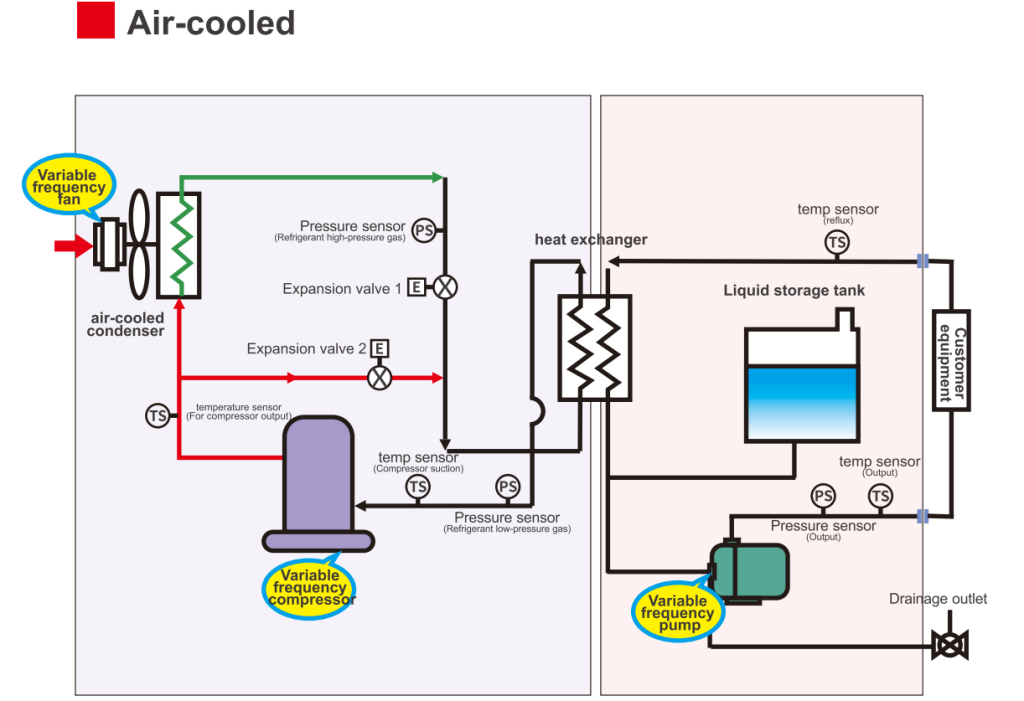
Quick Response
To avoid rapid temperature increases that can lead to product quality degradation and safety hazards, pharmaceutical reactor chillers must react instantly to temperature fluctuations, rapidly adjusting cooling and heating power to restore the reaction temperature to the target. This involves technical specifications such as temperature stabilization time, temperature adjustment slope, and heat load response delay.
Common Chillers for API Reactor Cooling
Common pharmaceutical reactor cooling equipment includes the following:
Low-Temperature Chillers
Low-temperature chillers can quickly remove heat generated by the reaction, maintaining process temperatures from -50°C up to ambient conditions. They are essential for low-temperature reaction stages in API production, such as crystallization, condensation, and purification.
Sistemi di controllo dinamico della temperatura
Dynamic temperature control systems are integrated temperature control solutions that combine heating and cooling functions. They are suitable for reactions requiring precise control of temperature gradients and can be used with glass reactors, jacketed reactors, and kettle reactors. These systems are ideal for processes with fluctuating thermal loads and rapid temperature transitions.
Explosion-Proof Chillers
The solvents used in API synthesis may be flammable. Explosion-proof chillers are essential in such hazardous environments to prevent sparks or high temperatures from causing safety hazards.

Conclusion
If you’re looking for a cooling system for your pharmaceutical reactor, LNEYA is happy to provide selection advice and a detailed quote. We have extensive experience designing and producing reactor chillers for numerous pharmaceutical companies and can customize a design based on your application.
Related chillers
CONTATTO
TEL:
EMAIL:
WeChat & WhatsApp:

Wechat QR

Hai domande o hai bisogno di un preventivo? Compila il modulo sottostante e il nostro team ti risponderà entro 24 ore.
 Refrigeratori industriali LNEYA Produttore Fornitore
Refrigeratori industriali LNEYA Produttore Fornitore









